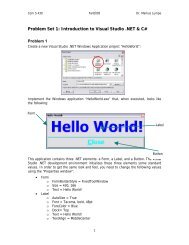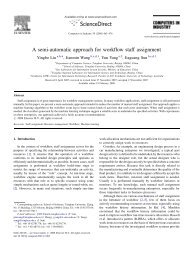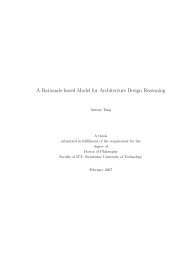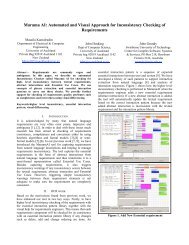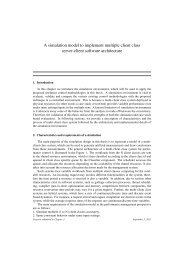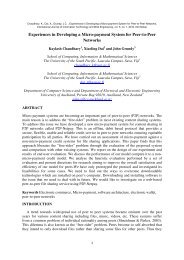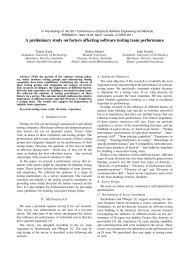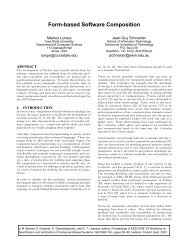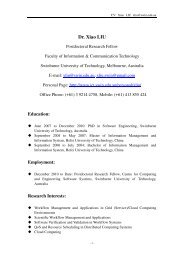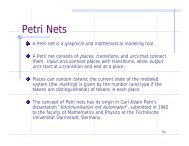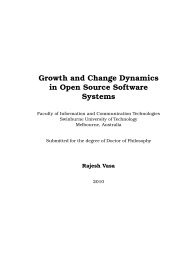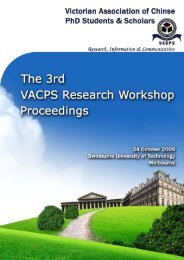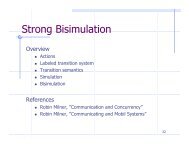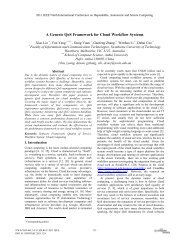Xiao Liu PhD Thesis.pdf - Faculty of Information and Communication ...
Xiao Liu PhD Thesis.pdf - Faculty of Information and Communication ...
Xiao Liu PhD Thesis.pdf - Faculty of Information and Communication ...
You also want an ePaper? Increase the reach of your titles
YUMPU automatically turns print PDFs into web optimized ePapers that Google loves.
temporal violations, viz. recoverable or non-recoverable.<br />
Finally, in Component 3, detected temporal violations are h<strong>and</strong>led. The<br />
conventional temporal verification philosophy believes that temporal violation<br />
h<strong>and</strong>ling should be triggered on every checkpoint, i.e. whenever a temporal violation<br />
is detected. However, the number <strong>of</strong> checkpoints for large scale scientific workflow<br />
applications is <strong>of</strong>ten huge in dynamic cloud computing environments, <strong>and</strong> thus<br />
results in significant cost on the h<strong>and</strong>ling <strong>of</strong> temporal violations. Therefore, we<br />
design a cost-effective adaptive temporal violation h<strong>and</strong>ling point selection strategy<br />
to further decide whether a checkpoint should be selected as a temporal violation<br />
h<strong>and</strong>ling point, i.e. temporal violation h<strong>and</strong>ling is necessary. Afterwards, when<br />
temporal violation h<strong>and</strong>ling points are selected, some temporal violation h<strong>and</strong>ling<br />
strategies are triggered to tackle the detected temporal violations. So far, temporal<br />
violation h<strong>and</strong>ling strategies in scientific cloud workflow systems have not been<br />
well investigated <strong>and</strong> the existing strategies are either <strong>of</strong> low performance or high<br />
cost. Therefore, in our temporal framework, an innovative temporal violation<br />
h<strong>and</strong>ling strategy is defined which consists <strong>of</strong> three levels <strong>of</strong> temporal violations<br />
(from minor to major) <strong>and</strong> their corresponding violation h<strong>and</strong>ling strategies (from<br />
weak capability to strong capability). In such a case, different levels <strong>of</strong> temporal<br />
violations can be h<strong>and</strong>led according to the capability <strong>of</strong> different temporal violation<br />
h<strong>and</strong>ling strategies with appropriate costs. Among many others, we focus on costeffective<br />
light-weight metaheuristics based workflow rescheduling strategies for<br />
statistically recoverable temporal violations. Specifically, with the design <strong>of</strong> a<br />
general two-stage local workflow rescheduling strategy, two representative<br />
metaheuristic algorithms including Genetic Algorithm (GA) <strong>and</strong> Ant Colony<br />
Optimisation (ACO) are adapted <strong>and</strong> implemented as c<strong>and</strong>idate temporal violation<br />
h<strong>and</strong>ling strategies.<br />
1.4 Overview <strong>of</strong> this thesis<br />
In particular, this thesis deals with the design <strong>of</strong> a comprehensive temporal<br />
framework which includes a set <strong>of</strong> new concepts, strategies <strong>and</strong> algorithms for the<br />
support <strong>of</strong> high QoS over the whole lifecycle <strong>of</strong> scientific cloud workflow<br />
applications. The thesis structure is depicted in Figure 1.2.<br />
9



